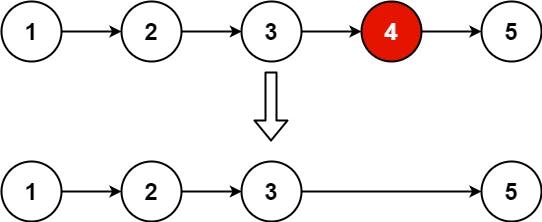19. Remove Nth Node From End of List
題目敘述
Given the head of a linked list, remove the n**th node from the end of the list and return its head.
Example:

Input: head = [1,2,3,4,5], n = 2
Output: [1,2,3,5]
Example 2:
Input: head = [1], n = 1
Output: []
Example 3:
Input: head = [1,2], n = 1
Output: [1]
Constraints:
- The number of nodes in the list is
sz. 1 <= sz <= 300 <= Node.val <= 1001 <= n <= sz
Follow up: Could you do this in one pass?
Hint 1:
Maintain two pointers and update one with a delay of n steps.
題目翻譯
給定一個連結序列 head,從中刪除由結尾算起來第 n 個節點,並回傳 head。
解法解析
這個題目主要用兩種解法,第一種是 Two pointer 和第二種 One Pass。但不管這兩種其實重點就是要先知道其序列的長度 L。因為是要從結尾往前推的第 n 個結點來算,而不管是 two pointer 還是 one pass 都只是由這結果往回推算或是紀錄第 n 個節點而已。
這邊要特別提到的是,滿多人提到官方的解法不能算是 one pass,因為用到兩個迴圈。但是執行上我個人認為的確可以說是 one pass,他只是中間切斷放到另一個迴圈來跑。但這個定義就見仁見智了。
解法範例
Go
Two pointer
/**
* Definition for singly-linked list.
* type ListNode struct {
* Val int
* Next *ListNode
* }
*/
func removeNthFromEnd(head *ListNode, n int) *ListNode {
dummy := &ListNode{0, head}
first := head
length := 0
for first != nil {
length++
first = first.Next
}
first = dummy
for i := length - n; i > 0; i-- {
first = first.Next
}
first.Next = first.Next.Next
return dummy.Next
}
One pass
/**
* Definition for singly-linked list.
* type ListNode struct {
* Val int
* Next *ListNode
* }
*/
func removeNthFromEnd(head *ListNode, n int) *ListNode {
dummy := &ListNode{0, head}
first := dummy
second := dummy
for i := 0; i <= n; i++ {
first = first.Next
}
for first != nil {
first = first.Next
second = second.Next
}
second.Next = second.Next.Next
return dummy.Next
}
JavaScript
Two pointer
/**
* Definition for singly-linked list.
* function ListNode(val, next) {
* this.val = (val===undefined ? 0 : val)
* this.next = (next===undefined ? null : next)
* }
*/
/**
* @param {ListNode} head
* @param {number} n
* @return {ListNode}
*/
var removeNthFromEnd = function (head, n) {
const dummy = new ListNode(0, head);
let length = 0,
first = head;
while (first) {
length++;
first = first.next;
}
first = dummy;
for (let i = length - n; i > 0; i--) {
first = first.next;
}
first.next = first.next.next;
return dummy.next;
};
One pass
/**
* Definition for singly-linked list.
* function ListNode(val, next) {
* this.val = (val===undefined ? 0 : val)
* this.next = (next===undefined ? null : next)
* }
*/
/**
* @param {ListNode} head
* @param {number} n
* @return {ListNode}
*/
var removeNthFromEnd = function (head, n) {
const dummy = new ListNode(0, head);
let first = dummy,
second = dummy;
for (let i = 0; i < n + 1; i++) {
first = first.next;
}
while (first !== null) {
first = first.next;
second = second.next;
}
second.next = second.next.next;
return dummy.next;
};
Kotlin
Two pointer
/**
* Example:
* var li = ListNode(5)
* var v = li.`val`
* Definition for singly-linked list.
* class ListNode(var `val`: Int) {
* var next: ListNode? = null
* }
*/
class Solution {
fun removeNthFromEnd(head: ListNode?, n: Int): ListNode? {
val dummy: ListNode = ListNode(0).apply { next = head }
var first: ListNode? = head
var length: Int = 0
while (first!!.next != null) {
length ++
first = first!!.next
}
first = dummy
for (i in (length - n) downTo 0) {
first = first!!.next
}
first!!.next = first?.next?.next
return dummy.next
}
}
One pass
/**
* Example:
* var li = ListNode(5)
* var v = li.`val`
* Definition for singly-linked list.
* class ListNode(var `val`: Int) {
* var next: ListNode? = null
* }
*/
class Solution {
fun removeNthFromEnd(head: ListNode?, n: Int): ListNode? {
val dummy: ListNode = ListNode(0).apply { next = head }
var first: ListNode? = dummy
var second: ListNode? = dummy
for (i in 0 until n) {
first = first!!.next
}
while (first!!.next != null) {
first = first!!.next
second = second!!.next
}
second!!.next = second?.next?.next
return dummy.next
}
}
PHP
Two pointer
/**
* Definition for a singly-linked list.
* class ListNode {
* public $val = 0;
* public $next = null;
* function __construct($val = 0, $next = null) {
* $this->val = $val;
* $this->next = $next;
* }
* }
*/
class Solution
{
/**
* @param ListNode $head
* @param Integer $n
* @return ListNode
*/
function removeNthFromEnd($head, $n)
{
$dummy = new ListNode(0, $head);
$first = $head;
$length = 0;
while (!is_null($first)) {
$length++;
$first = $first->next;
}
$first = $dummy;
for ($i = $length - $n; $i > 0; $i--) {
$first = $first->next;
}
$first->next = $first->next->next;
return $dummy->next;
}
}
One pass
/**
* Definition for a singly-linked list.
* class ListNode {
* public $val = 0;
* public $next = null;
* function __construct($val = 0, $next = null) {
* $this->val = $val;
* $this->next = $next;
* }
* }
*/
class Solution
{
/**
* @param ListNode $head
* @param Integer $n
* @return ListNode
*/
function removeNthFromEnd($head, $n)
{
$dummy = new ListNode(0, $head);
$first = $dummy;
$second = $dummy;
for ($i = 0; $i < $n + 1; $i++) {
$first = $first->next;
}
while (!is_null($first)) {
$first = $first->next;
$second = $second->next;
}
$second->next = $second->next->next;
return $dummy->next;
}
}
Python
Two pointer
# Definition for singly-linked list.
# class ListNode:
# def __init__(self, val=0, next=None):
# self.val = val
# self.next = next
class Solution:
def removeNthFromEnd(self, head: ListNode | None, n: int) -> ListNode | None:
dummy: ListNode = ListNode(0, head)
length: int = 0
first: ListNode = head
while first is not None:
length += 1
first = first.next
first = dummy
for _ in range(length - n, 0, -1):
first = first.next
first.next = first.next.next
return dummy.next
One pass
# Definition for singly-linked list.
# class ListNode:
# def __init__(self, val=0, next=None):
# self.val = val
# self.next = next
class Solution:
def removeNthFromEnd(self, head: ListNode | None, n: int) -> ListNode | None:
dummy: ListNode = ListNode(0, head)
first: ListNode = dummy
second: ListNode = dummy
for _ in range(n + 1):
first = first.next
while first is not None:
first = first.next
second = second.next
second.next = second.next.next
return dummy.next
Rust
Swift
Two pointer
/**
* Definition for singly-linked list.
* public class ListNode {
* public var val: Int
* public var next: ListNode?
* public init() { self.val = 0; self.next = nil; }
* public init(_ val: Int) { self.val = val; self.next = nil; }
* public init(_ val: Int, _ next: ListNode?) { self.val = val; self.next = next; }
* }
*/
class Solution {
func removeNthFromEnd(_ head: ListNode?, _ n: Int) -> ListNode? {
guard let head = head else { return nil }
let dummy = ListNode(0, head)
var length: Int = 0
var first: ListNode? = head
while first != nil {
length += 1
first = first?.next
}
first = dummy
for _ in 0..<(length - n) {
first = first?.next
}
first!.next = first?.next?.next
return dummy.next
}
}
One pass
/**
* Definition for singly-linked list.
* public class ListNode {
* public var val: Int
* public var next: ListNode?
* public init() { self.val = 0; self.next = nil; }
* public init(_ val: Int) { self.val = val; self.next = nil; }
* public init(_ val: Int, _ next: ListNode?) { self.val = val; self.next = next; }
* }
*/
class Solution {
func removeNthFromEnd(_ head: ListNode?, _ n: Int) -> ListNode? {
guard let head = head else { return nil }
let dummy = ListNode(0, head)
var first: ListNode? = dummy
var second: ListNode? = dummy
for _ in 0...n {
first = first?.next
}
while first != nil {
first = first?.next
second = second?.next
}
second!.next = second?.next?.next
return dummy.next
}
}
